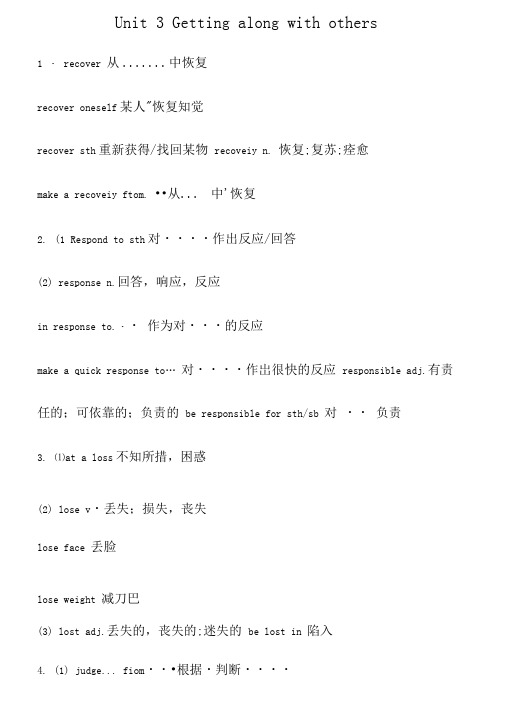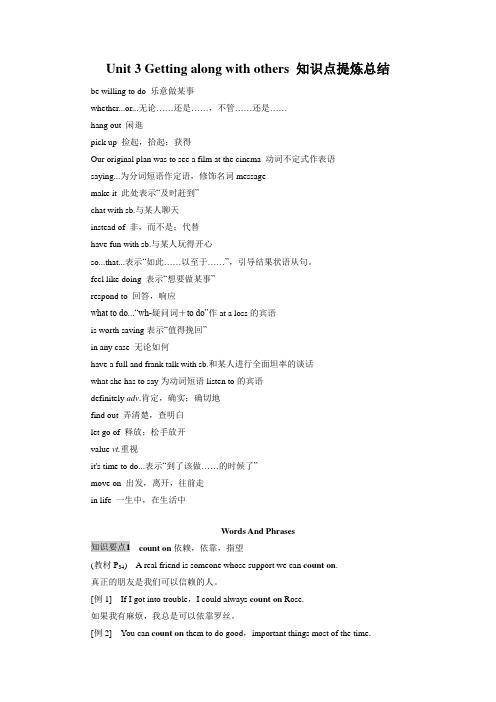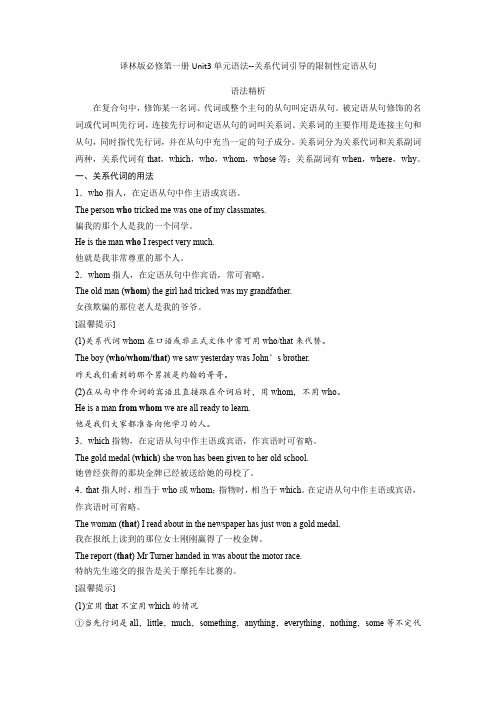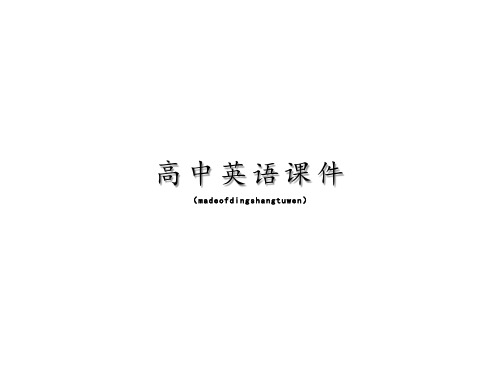高一英语暑假精品课(译林版2020必修第一册)unit3语法讲解
- 格式:doc
- 大小:103.50 KB
- 文档页数:4

Unit3 Getting along with others重点小结【重点词汇】1.sight n.视力;视觉;视野out of sight看不见;在视线外in/within sight看得见;在视线内catch sight of看见at first sight乍看起来;一看见at the sight of一看见……lose sight of看不见lose one’s sight失明come into sight进入视野中2.make it能够出席;准时到达;获得成功3.recover vi.恢复健康;恢复常态vt.全额收回;寻回;重新获得;恢复,重新控制recover from...从……中恢复recover oneself某人恢复知觉recover sth重新获得/找回某物recovery n.恢复;复苏;痊愈make a recovery from...从……中恢复4.respond vi. & vt.回答,回应;作出反应,响应respond to sth对……作出反应/回答response n.回答,响应,反应in response to...作为对……的反应make a quick response to...对……作出很快的反应responsible adj.有责任的;可依靠的;负责的be responsible for sth/sb对……负责5.loss n.失去,丧失;亏损;去世;损失at a loss不知所措,困惑lose v.丢失;损失,丧失lose face丢脸lose weight减肥lost adj.丢失的,丧失的;迷失的be lost in陷入……6.judge vi.&vt.评价,(尤指)批评;判断,认为n.法官;裁判员judge...from...根据……判断……judging from/by...根据……判断judgment n.判断,判决书make a judgment 作判断7.apologize vi.道歉,谢罪apology n.道歉;认错apologize (to sb) for (doing)sth因(做)某事(向某人)道歉apologize for oneself为自己辩解或辩护accept sb’s apology 接受某人的道歉owe sb an apology应向某人道歉make an apology to sb for sth因某事向某人道歉8.behaviour n.行为,举止,态度behave v.表现;有礼貌behave well/badly to/towards sb对某人表现好/差behave oneself守规矩,表现得体9.case n.具体情况,事例;案件;容器in case 万一,以防万一in case of...假使……/万一……in any case无论如何,总之in this/that case如果这样/那样的话,在这种/那种情况下in no case 决不in the case of...就……来说as is often the case这是常有的事as the case may/might be看情况,视情况而定10.ignore vt.忽视,对……不予理会ignorance n.无知;愚昧out of ignorance 出于无知ignorant adj.无知的;愚昧的be ignorant of 不了解;不知情11.suffer vi.受苦,受折磨;变差vt.遭受,蒙受suffer from遭受;患病suffer pain/defeat/hardship/damage遭受痛苦/失败/艰难/破坏suffering n.痛苦;苦恼;让人痛苦的事sufferer n.患难者;患病者12.count on依赖,依靠,指望count on/upon=depend/rely on/upon依赖,依靠count on sb to do sth依靠/指望某人做某事count...in把……包括在内count...out不包括count sb/sth as/to be...把某人/物看作……count up=add up把……加起来countable adj.可数的13.in person亲自,亲身in order按顺序in pain痛苦,在苦恼中in trouble处于困境中in silence在寂静中in surprise惊奇地14.have trouble (in) doing sth做某事有困难/麻烦in trouble在危险、受罚、忧虑的处境中out of trouble摆脱麻烦;脱离困境get into trouble陷入困境;遇到麻烦get sb into/out of trouble使某人陷入/摆脱困境take the trouble to do sth不辞辛劳做某事;费神做某事have trouble with sth做某事有困难/麻烦15.respect vt.尊重,尊敬n.尊敬,敬意;重视respect sb for sth因某事而尊重某人have/show respect for sb尊重某人out of respect for...出于对……的尊敬;顾及16.bring out使显现,使表现出bring about带来;引来;造成bring along使发展;促使成长bring down打落;击落;降低bring forth生产;产出bring forward提出;把……提前bring in带来;引来;引进bring up 抚养;教育;提出;呕吐17.measure vt.估量,判定;测量;有……长/宽/高n.措施;衡量measure...by...用……来衡量……make...to one’s measure按某人的尺寸做(衣服等)take measures to do sth采取措施做某事in some measure 在某种程度上economy measures 节约措施economic measures 经济措施measurement n.测量18.reflection n.沉思;反射;映像;反映be lost in reflection陷入深思之中reflect vt.映射;反射vi.思考reflect...in...在……中反映出/映照出……reflect on思考,反省19.seek (sought, sought)vi.试图;寻找;争取vt.寻求;寻找seek one’s fortune/fame追求财富/名誉;碰运气seek after/for寻找;追求seek sth from sb向某人寻求某物seek to do sth(=try/attempt to do sth)试图/企图做某事20.escape vi.&vt.逃跑,逃脱;避开,避免;被遗忘n.逃离,逃脱escape from 从……逃脱/逃避escape from reality逃避现实escape into逃入escape (doing) sth避免(做)某事escape punishment=escape being punished 逃避处罚make one’s escape逃走a fire escape消防通道a narrow escape 死里逃生21.be meant to do sth注定要做某事,应做某事sth is meant for sth/sb某物是为……准备/设计的mean to do sth打算做某事mean doing sth意味着做某事meant to have done = had meant to do本来打算做(实际上没做)22.benefit n.好外;益处vt.使受益vi.得益于sth benefit(s) sb某事对某人有益sb benefit(s) from sth某人从某事中受益be of benefit to...对……有益for one’s benefit为了帮助某人;为了某人的利益to one’s benefit对某人有益beneficial adj.有益的;受益的be beneficial to...(=be of benefit to...) 对……有益23.take on呈现,具有;承担;接受;从事;较量;开始雇用take away 拿走;带走;夺走take back 退回;拿回;归还take down记下;拆卸take in 吸收;理解;欺骗take off 脱下;起飞;休假;(事业)腾飞take out 取出;拔掉;带出去take over接管;接任24.moment n.时光,时机;瞬间;某个时刻at the moment 此刻,目前,那时(常用于一般现在时、一般过去时和进行时) at that moment 就在那时,当时for a moment一会儿,片刻(表示片刻的延缓,常与延续性动词连用)for the moment目前,暂时in a moment(=in a minute;very soon)立即,马上(多与将来时连用)the moment+从句=as soon as/the minute/the instant/the second/directly/immediately+从句=hardly/scarcely...when...=no sooner...than...一……就……fort vt.宽慰,抚慰n.舒服;安慰comfort sb 安慰某人in comfort舒服地take comfort from...从……中得到慰藉comfortable adj.舒适的,(人)安逸的uncomfortable adj.不舒服的,不安逸的discomfort n.不舒服;不安comfortably adv.安逸地26.recognize vt.承认,意识到;认出,辨别出recognize sb/one’s voice认出某人/听出某人的声音be recognized to be/as...被认为是……It is recognized that...人们公认……recognition n.认出;认识beyond (all) recognition(完全)认不出来27.admire vt.钦佩;欣赏admire sb for(doing) sth因为(做)某事而钦佩某人admirer n.崇拜者admiration n.佩服admiring adj.羡慕的;钦佩的admirable adj.令人钦佩的;值得赞美的【重点句式】1.Whether we’re walking to school,doing homework or just hanging out at theweekend,we’re hardly out of each other’s sight.无论我们是步行去学校,做作业还是只是在周末闲逛,我们几乎不离开彼此的视线。


Unit 3 Getting along with others1 ・ recover 从....... 中恢复recover oneself某人"恢复知觉recover sth重新获得/找回某物recoveiy n. 恢复;复苏;痊愈make a recoveiy ftom. ••从... 中'恢复2.(1 Respond to sth对・・・・作出反应/回答(2) response n.回答,响应,反应in response to.・・作为对・・・的反应make a quick response to… 对・・・・作岀很快的反应responsible adj.有责任的;可依靠的;负责的be responsible for sth/sb 对・・负责3.⑴at a loss不知所措,困惑(2) lose v・丢失;损失,丧失lose face 丢脸lose weight 减刀巴(3) lost adj.丢失的,丧失的;迷失的be lost in 陷入4.(1) judge... fiom・・•根据・判断・・・・judging froni/by...根据・・・判断⑵judgment n.判断,判决书make a judgment 作判断⑶judging by/from为独立主格结构作状语,此处的judging 一般不用judged 形式。
5.apologize (to sb) for (doing) sth 因(做)某事(向某人)道歉apologize for oneself为自己乳辛角牟或辩护accept sb * s apology接受某人的道歉owe sb an apology应向某人道歉make an apology to sb for sth因某事向某人道歉6.behave well/badly to/towards sb 对某人表现好/差behave oneself守规矩,表现得体He is now better behaved.他现在表现得更好了。

Unit 3 Getting along with others 知识点提炼总结be willing to do 乐意做某事whether...or...无论……还是……,不管……还是……hang out 闲逛pick up 捡起,拾起;获得Our original plan was to see a film at the cinema 动词不定式作表语saying...为分词短语作定语,修饰名词messagemake it 此处表示“及时赶到”chat with sb.与某人聊天instead of 非,而不是;代替have fun with sb.与某人玩得开心so...that...表示“如此……以至于……”,引导结果状语从句。
feel like doing 表示“想要做某事”respond to 回答,响应what to do...“wh疑问词+to do”作at a loss的宾语is worth saving表示“值得挽回”in any case 无论如何have a full and frank talk with sb.和某人进行全面坦率的谈话what she has to say为动词短语listen to的宾语definitely adv.肯定,确实;确切地find out 弄清楚,查明白let go of 释放;松手放开value vt.重视it's time to do...表示“到了该做……的时候了”move on 出发,离开,往前走in life 一生中,在生活中Words And Phrases知识要点1count on依赖,依靠,指望(教材P34) A real friend is someone whose support we can count on.真正的朋友是我们可以信赖的人。
[例1]If I got into trouble,I could always count on Rose.如果我有麻烦,我总是可以依靠罗丝。

译林版必修第一册Unit3单元语法--关系代词引导的限制性定语从句语法精析在复合句中,修饰某一名词、代词或整个主句的从句叫定语从句。
被定语从句修饰的名词或代词叫先行词,连接先行词和定语从句的词叫关系词。
关系词的主要作用是连接主句和从句,同时指代先行词,并在从句中充当一定的句子成分。
关系词分为关系代词和关系副词两种,关系代词有that,which,who,whom,whose等;关系副词有when,where,why。
一、关系代词的用法1.who指人,在定语从句中作主语或宾语。
The person who tricked me was one of my classmates.骗我的那个人是我的一个同学。
He is the man who I respect very much.他就是我非常尊重的那个人。
2.whom指人,在定语从句中作宾语,常可省略。
The old man (whom) the girl had tricked was my grandfather.女孩欺骗的那位老人是我的爷爷。
[温馨提示](1)关系代词whom在口语或非正式文体中常可用who/that来代替。
The boy (who/whom/that) we saw yesterday was John’s brother.昨天我们看到的那个男孩是约翰的哥哥。
(2)在从句中作介词的宾语且直接跟在介词后时,用whom,不用who。
He is a man from whom we are all ready to learn.他是我们大家都准备向他学习的人。
3.which指物,在定语从句中作主语或宾语,作宾语时可省略。
The gold medal (which) she won has been given to her old school.她曾经获得的那块金牌已经被送给她的母校了。
4.that指人时,相当于who或whom;指物时,相当于which。

Unit 3 Getting along with others 1.recover from...从……中恢复recover oneself某人恢复知觉recover sth重新获得/找回某物recovery n.恢复;复苏;痊愈make a recovery from...从……中恢复2.(1)respond to sth对……作出反应/回答(2)response n.回答,响应,反应in response to...作为对……的反应make a quick response to...对……作出很快的反应responsible adj.有责任的;可依靠的;负责的be responsible for sth/sb对……负责3.(1)at a loss不知所措,困惑(2)lose v.丢失;损失,丧失lose face丢脸lose weight减肥(3)lost adj.丢失的,丧失的;迷失的be lost in陷入……4.(1)judge...from...根据……判断……judging from/by...根据……判断(2)judgment n.判断,判决书make a judgment 作判断(3)judging by/from 为独立主格结构作状语,此处的judging 一般不用judged形式。
5.apologize (to sb) for (doing)sth因(做)某事(向某人)道歉apologize for oneself为自己辩解或辩护accept sb’s apology 接受某人的道歉owe sb an apology应向某人道歉make an apology to sb for sth因某事向某人道歉6.behave well/badly to/towards sb对某人表现好/差behave oneself守规矩,表现得体He is now better behaved.他现在表现得更好了。
第06讲必修一unit3语法讲解(原卷版)Unit 3 关系代词引导的定语从句定语从句:在一个主从复合句中修饰某一个名词、代词或修饰整个主句的从句叫定语从句。
换句话说,定语从句就是用来作定语的句子。
先行词:被定语从句修饰的名词或代词叫先行词。
关系代词:连接先行词和定语从句的词叫关系词。
若先行词在从句中作主语、宾语和定语等,应用关系代词引导定语从句。
关系代词具体有:that, which, who, whom, whose定语从句的位置:一般紧跟在先行词后面。
但有时因句子结构的需要,定语从句和先行词被某些成分隔开。
关系代词的基本用法使用关系代词时应注意的几个问题:a. 在以下几种情况下只使用that不用which。
1.先行词是不定代词时,如: all, anything, everything, nothing, something, little, few, much。
1.I told him all (that) I know.2.He gave her everything (that) he had.2.先行词被all, every, any, the very, the only, the just等修饰时。
1.I have read all the books (that) you gave me.2.You can take any book (that) you like.3.先行词被序数词和形容词的最高级修饰时。
1. This is the best book (that) I have ever read.2. The second place (that) I want to visit is Shanghai.4.先行词既有人又有物时。
1.We talked about the persons and things (that) we remember in the school.2.The people and the animals that were killed in the earthquake have all been found. 5.在Who, Which引起的疑问句中。
高一英语暑假精品课(译林版2020必修第一册)
unit3语法讲解
1.初步掌握必修一第三单元的语法知识点-关系代词引导的定语从句
2.能够运用该单元的语法正确做题
Unit 3 关系代词引导的定语从句
定语从句:在一个主从复合句中修饰某一个名词、代词或修饰整个主句的从句叫定语从句。
换句话说,定语从句就是用来作定语的句子。
先行词:被定语从句修饰的名词或代词叫先行词。
关系代词:连接先行词和定语从句的词叫关系词。
若先行词在从句中作主语、宾语和定语等,应用关系代词引导定语从句。
关系代词具体有:that, which, who, whom, whose
定语从句的位置:一般紧跟在先行词后面。
但有时因句子结构的需要,定语从句和先行词被某些成分隔开。
关系代词的基本用法
使用关系代词时应注意的几个问题:
a. 在以下几种情况下只使用that不用which。
1.先行词是不定代词时,如: all, anything, everything, nothing, something, little, few, much。
1.I told him all (that) I know.
2.He gave her everything (that) he had.
2.先行词被all, every, any, the very, the only, the just等修饰时。
1.I have read all the books (that) you gave me.
2.You can take any book (that) you like.
3.先行词被序数词和形容词的最高级修饰时。
1. This is the best book (that) I have ever read.
2. The second place (that) I want to visit is Shanghai.
4.先行词既有人又有物时。
1.We talked about the persons and things (that) we remember in the school.
2.The people and the animals that were killed in the earthquake have all been found.
5.在Who, Which引起的疑问句中。
1. Who is the boy that helped you?
2. Which is the book (that) you bought yesterday?
6. 若有两个定语从句,一个用which引导,另一个须用that引导。
He bought a book which could give him knowledge and that could help to kill the time.
7. 当先行词在定语从句中作表语时。
Mary is no longer the girl (that) she used to be.
b.在以下几种情况下只使用which 不用that。
1. 引导非限制性定语从句时。
I have lost my pen, which I like very much. (which 作宾语,指代主句中的pen)
New concept English is intended for foreign students, which is known to all of us. (which作主语,指代整个主句)
2. 若有两个定语从句,其中一个关系代词是which,另一个须用that。
The book (that) he bought yesterday was the one (which) he liked best.
3. 先行词在句中作介词宾语且介词前置时。
This is the house in which Lu Xun once lived.
c.当先行词为指人的关系代词时,引导词只用who 不用that。
1. 先行词为all, anyone, one / ones, those, people 时,须用who。
1. Anyone who knows how to do it can do it now.
2. Those who want to see the film please put up your hands.
3. He, who does not reach the Great Wall, is not a true man.
2. 在非限制性定语从句中,须用who。
Tom’s father, who is over sixty, still works hard.
3. 在被分隔的定语从句中,须用who。
A new teacher will come tomorrow who will teach you German.
4. 在以there be开头的句子中,多用who。
There is a stranger who wants to see our headmaster.
5. 若有两个定语从句,其中一个关系代词是that,另一个须用who。
The student who was praised at the meeting is the monitor that studies very hard.
d. as和which的使用场合。
如: As we all know, he studies very hard.
比较:He studies very hard, as / which we all know.
I’ve never seen such a clever man as he is.
He has to work on Sundays, which he doesn’t like.
He was late, which made the teacher angry.
The bridge is really wonderful, as (is) shown in the picture.
The experiment is very important, as indeed it is.
e. the same…as …和the same… that…的不同。
This is the same book as I lent you yesterday.
这本书和我昨天借给你的相似。
(相似物)
This is the same book that I lent you yesterday.
这正是我昨天借给你的那本书。
(同一物)。